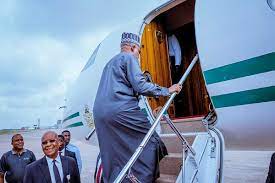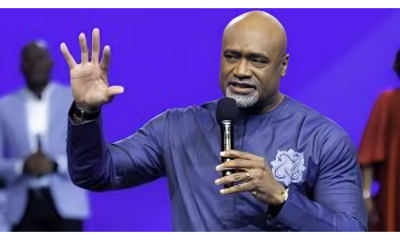Foreign News
FBI Accuses Iran, Russia of Having US Voter Information

US national security officials say Iran was responsible for sending threatening emails to Democratic voters ahead of next month’s presidential election.
The emails appeared to come from a far-right pro-Trump group and were meant to “incite unrest”, National Intelligence Director John Ratcliffe said.
Mr Ratcliffe also said US officials found Iran and Russia had obtained “some voter registration information”.
Both Iran and Russia denied the accusations of election interference.
“Iran’s strong rejection of American officials’ repetitive, baseless and false claims was conveyed to the Swiss ambassador [who represents US interests in Tehran],” Iranian foreign ministry spokesman Saeed Khatibzadeh told state TV.
“As we have said before, it makes no difference for Iran who wins the US election,” he added.
Kremlin spokesman Dmitry Peskov told the BBC: “We think this is unfortunate. These accusations come every day, they are all completely groundless, they are based on nothing.”
“They are most likely some sort of internal political process connected with the upcoming elections.”
Mr Ratcliffe’s decision to hold a briefing so close to the presidential election was seen as a testament to the government’s concerns over voting interference and disinformation campaigns from foreign actors.
The intelligence chief said Iran’s “spoof emails” claimed to be sent by the far-right Proud Boys group in order to “intimidate voters, incite unrest and damage” President Donald Trump.
He added that the voter data could be used in attempts to “communicate false information to registered voters that they hope will sow confusion chaos and undermine your confidence in American democracy”.
Mr Ratcliffe said officials “have not seen the same actions from Russia”, but are aware they have some voter information.
In many states, voter data is available upon request, though each state has different requirements on who can request voter information, what data is available and how this data might be used, according to the National Conference of State Legislatures.
“If you receive an intimidating or manipulative email in your inbox, don’t be alarmed and do not spread it,” Mr Ratcliffe said, calling the actions to influence US voters “desperate attempts by desperate adversaries”.
This announcement inevitably has shades of the 2016 Russian interference in the US election.
In that election thousands of fake bots were created on social media pretending to be American voters.
Democrat computer systems were also hacked.
From this announcement, though, it’s unclear how Iran and Russia obtained the information – and exactly what info they have.
You only have to look at your spam filter to see that many people have your email address.
The main charge against Iran is it has sent “spoof emails” to voters in swing states. If true, this is unlikely to be a sophisticated attack.
Foreign News
China to Eliminate Tariffs on Imports from African Countries

China has announced the full removal of tariffs on imports from all African countries, ENA, a partner of TV BRICS, has reported.
The tariff elimination falls under the new China-Africa Economic Partnership for Shared Development, a framework designed to accelerate Africa’s integration into global trade by increasing market access, improving customs procedures, and strengthening institutional trade capacity.
The initiative is part of a broader effort by Beijing to support industrialisation, diversify imports, and reinforce economic links with African states beyond raw materials.
President Xi Jinping reaffirmed China’s readiness to welcome all African exports under zero-tariff treatment.
He emphasised that the new arrangement would be accompanied by enhanced cooperation in customs, quarantine, logistics, and capacity building.
China also pledged to support training programmes and expand the visibility of high-quality African goods in the Chinese market.
In 2024, China–Africa trade reached nearly 300 billion dollars, consolidating China’s position as Africa’s largest trading partner.
Observers note that the new tariff policy may further strengthen the African Continental Free Trade Area by encouraging intra-African production and export diversification.
The strategic shift is expected to unlock new opportunities for value-added goods and services from across the continent, reinforcing Africa’s role in global supply chains. (TV BRICS/NAN)
CRIME
Man in Germany Charged with Serial Rape After Drugging Victims

German prosecutors on Tuesday have charged a 43-year-old Chinese national with 22 offences, including attempted murder and aggravated rape after drugging victims, in some cases involving women he knew.
The accused, who was not identified, is suspected of sedating women with sleeping pills and raping them in eight cases.
Prosecutors in Frankfurt said some victims knew the defendant and were unaware of what was happening.
In four cases, the man is suspected of overpowering, anaesthetising and raping the victims during property viewings and of videoing or photographing the acts.
In seven cases, the drug dose was so high it may have endangered victims’ lives, prosecutors said in a statement.
The accused is alleged to have been a member of the Telegram online platform for several years, where he exchanged information about how to sexually assault unconscious women.
He is also believed to have illegally sold sedatives to other chat participants, prosecutors said.
The man from Offenbach, near Frankfurt, is believed to have committed the offences between January 2020 and November 2024, and has been in custody since November 2024, prosecutors said.
The charges follow the high-profile case of Dominique Pelicot in France, convicted in December of repeatedly drugging and raping his wife for almost a decade and inviting dozens of strangers to rape her unconscious body. (Reuters/NAN)
Foreign News
Man Bites Off Part of Another Man’s Ear On Train

A fight on a German train saw a man bite off a piece of another man’s ear, police said on Monday.
The incident occurred on a Deutsche Bahn train between the south-western cities of Mannheim and Stuttgart.
An argument broke out after an unknown man accused a 43-year-old man of looking at his partner.
The former bit the ear of the 43-year-old, who retaliated by biting the man’s finger.
According to police, the unidentified man and his companion were able to leave the train at the central station in Stuttgart and fled.
Police said that they are searching for the man’s identity.
The 43-year-old was taken to the hospital, where the piece of his ear was sewn back on.
(dpa/NAN)(www.nannews.ng)






























